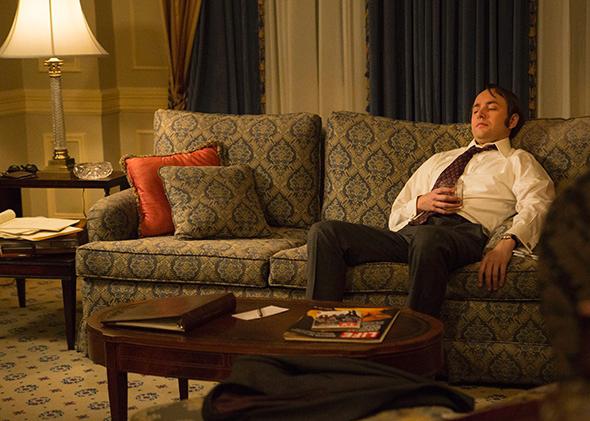Julia, John,
I admired this episode for pulling off a very difficult feat—it delivered so much of the jacked up drama and surprise we’ve been waiting for (Weiner loves to pack it into the penultimate episode), and yet the action didn’t seem extraneous. Instead, it pushed the characters to where Weiner has always wanted them to go: toward their inner angel.
For me, the episode revealed how deeply moralistic Weiner is. Each character became the best they could be, given their own limits. Betty, the least loved character on Mad Men, suddenly seemed like a realist, and tough—this is the Betty who once expertly shot a hunting rifle. Her concern about appearances seemed less like superficiality than a candid assessment of the only field she ever knew how to play on, and win. After all, even the boys at school don’t value her for her brains. (Mrs. Robinson.) I’ve never known anyone to accommodate to a cancer diagnosis so quickly. But in Betty’s case it made sense. What her letter revealed is that she knew she wasn’t cut out for an era where girls wear their hair long and loose, travel to Europe with their girlfriends, and debate psychoanalytic theory. She was made for an age of surfaces, and it was time for her to go, so she accepted the diagnosis with grace.
John, you asked whether we should really believe Pete has changed. Again, he’s changed the most he can within his own pretty severe moral limits. Pete conducted his transformation the same way he conducts the rest of his life: with pettiness, conniving, lies (“Remind me to make a donation to Lincoln Center”), insecurity worked out through a salary negotiation and a fine steak (flown in from Wichita). I wasn’t convinced that Pete came to a new conviction about infidelity but he didn’t appear to have the same entitlement to it as his father and brother. Pete never seemed to have any fun when he was fooling around. Maybe what he realized is that he’s better off in partnership with the equally canny and conniving Trudy. (When she offered her so-called friend a shiny apple, I immediately thought of Snow White.) I could imagine Trudy lording her tennis skills over some suburban Midwestern moms, while Pete turns into one of the assholes he used to entertain in the office who come to New York in search of a higher grade stripper than the one they could find at home.
Sally reading Betty’s letter also made me cry, John. We’ve always been led to believe that Betty misunderstands Sally. She’s seen her daughter as wayward, dangerous, a troublemaker, a kid who can’t buckle to authority or do what she needs. Betty has failed to see the other side of Sally, who always notices when other people are doing wrong. But it turns out that when it comes down to it, Betty understands perfectly who Sally is at her core: the eldest child who can be relied on more than the men in Betty’s life not to fall apart in an emergency, who will take care of all the details—blue chiffon dress, lipstick in the handbag—and even remember that now she’ll have to be the one to provide maternal comfort to her little brothers and take them on her lap. She is, if not perfect, then perfectly dutiful. Sally understood it too, which is why she instantly improvised a good and self-sacrificing lie to explain to her brother why she was home, so he wouldn’t have to worry. (Got in trouble again, don’t want to talk about it.)
As for Don, he was receiving clues to his destiny from little snippets we heard on the television: “Traveling salesman.” “You see couples with no children.” When the hotel proprietor who invited him to the party said, “Mr., I know you’re not in a rush,” that was the truest thing anyone could have said. Don has always been running, moving through a kind of life he thinks a person should have. But I think what he learned here is that rootless Don is the real Don. He’s not Pete; he wasn’t made for marriage or a settled life. Out here, on his own, in this town where everyone knows everyone, Don was the only honest man around. I love how he kept correcting the young con man’s grammar. He was being set up as the young man’s Henry Higgins. So when it came time to deliver his real lesson—that hustling and then disappearing into new identities is “not what you think it is” and the wrong way to start off in life, he could be convincing. Where he seemed genuinely happy, and himself, was on that bench, alone, where there was nothing he had to prove or be.
What I loved most is the episode’s take on the heartland. The episode’s title, “The Milk and Honey Route,” takes its inspiration from one of the Bible’s most alarming passages. God tells Moses to lead his people to the “land flowing with milk and honey,” but then adds. “I will not go with you because you are a stiff necked people and I might destroy you on the way.” Thanks, God. Way to give relief and then take it away. Don is out there searching for a respite from the city. What he finds instead are broken appliances, a young con man, and a bunch of crazy drunks who whack him on the head with a phonebook. Even a two-headed cow can’t make up for that.
I made a roast,
Hanna
